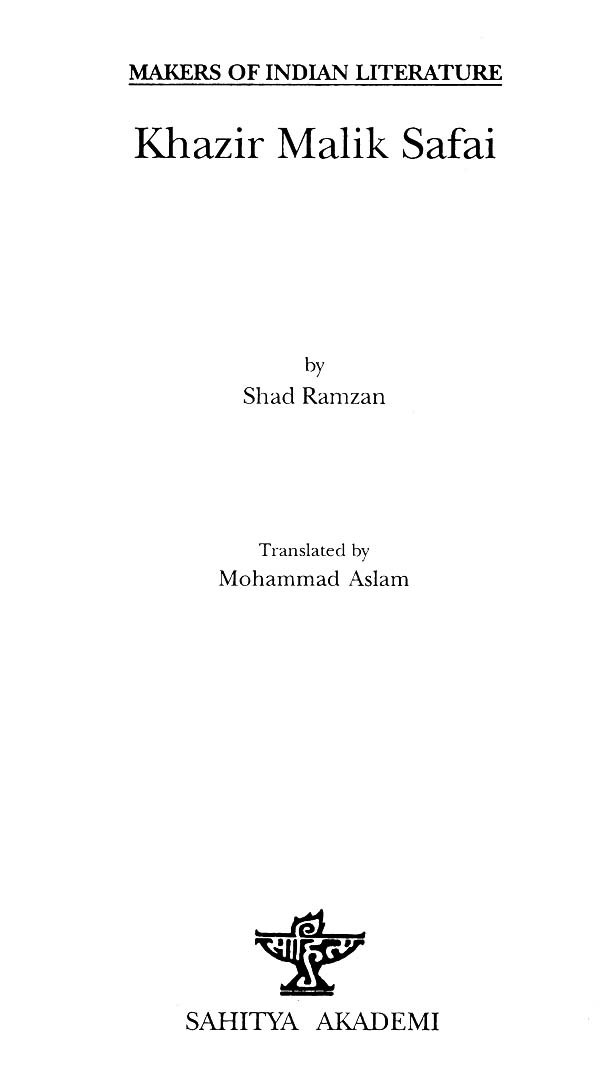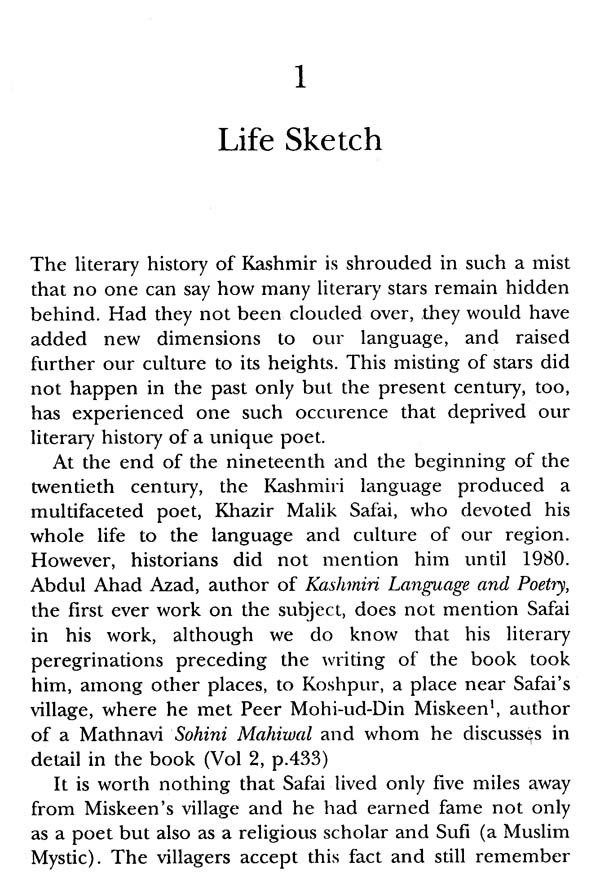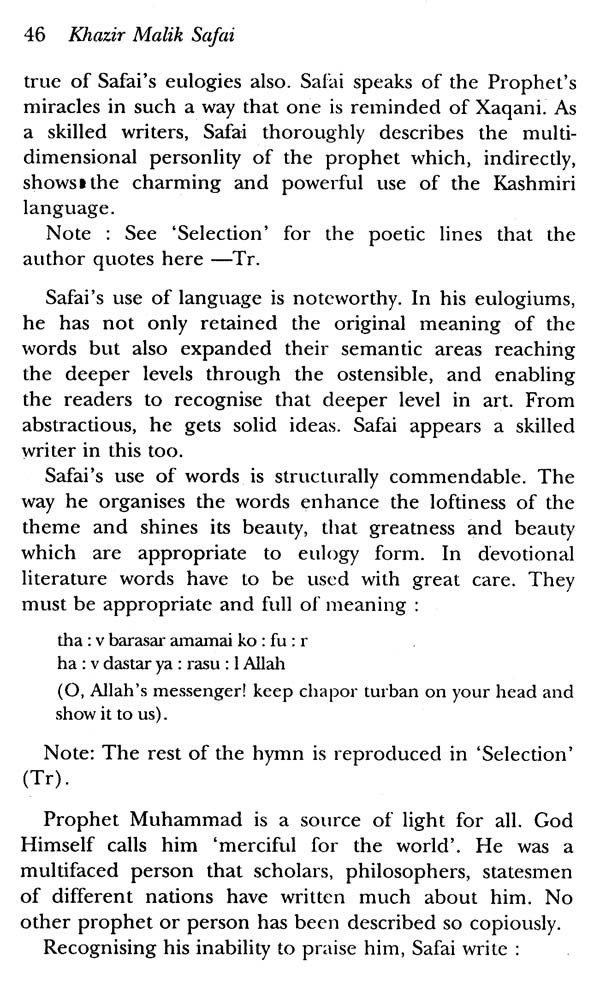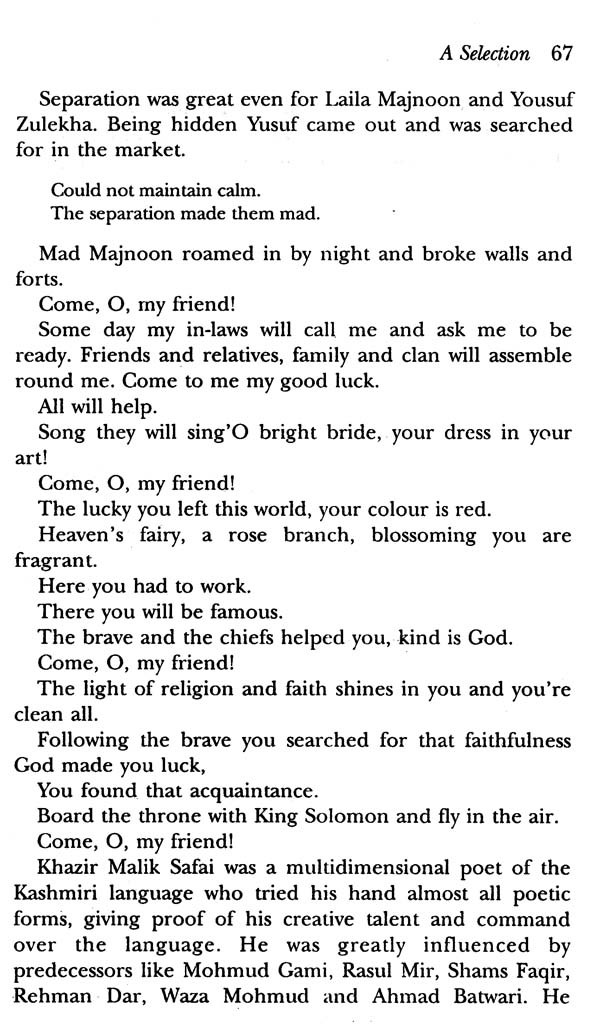
Khazir Malik Safai: Makers of Indian Literature
Book Specification
| Item Code: | AZI005 |
| Author: | Shad Ramzan |
| Publisher: | SAHITYA AKADEMI, DELHI |
| Language: | English |
| Edition: | 1999 |
| ISBN: | 812600777X |
| Pages: | 77 |
| Cover: | Paperback |
| Other Details | 8.50x5.50 inches |
| Weight | 108 gm |
Book Description
Khazir Malik Safai (1848-1920) was an important Kashmiri Sufi poet who devoted his whole life to the language and culture of Kashmir. A great scholar of Persian and Arabic, he was not only a hafiz but also one who understood delicate Quranic issues.
Safai used different forms of poetry mathnavi, ghazal, vatsan, nazm, hymns and eulogies. In his poetry, an incident, a thought or an experience is quite realistically presented. His use of words is with graphic vividness. His handling of language is exalting enhancing the loftiness to the theme. His scholarship on Persian poetry is evident from his translation of Jami, Nazami, Ansuri, Khusro, Hafiz and Rumi.
Shad Ramzan, the author of the monograph, is a poet himself. His prose writing got largely influenced by his skill in using a metaphorical and figurative language.
Mohammad Aslam, the translator, obtained M.A; M. Phil and Ph.D. from Kashmir University and Master's degree in Linguis tics from the University of Leeds. A researcher in literature and linguistics, Dr. Aslam has contributed articles to many periodicals in language and literature.
Living in the present but preserving the past traditions has been a specialty of poets like Mirza Ghalib. Such a feeling we get when we read Khazir Malik Safai. He did not only study his contemporary environment but also the past. He had a thorough knowledge of Kashmiri traditions and Persian poetry. He took help from both and, thus, emerged as a unique poet.
In Kashmiri literary history, Safai occupies a unique position in two ways: one, he edited his poetic collection before his near-contemporary Wahab Hajini, two, he tried his skill in almost all poetic forms, coming close to Mehmud Gami. He benefitted from Rasul Mir, and made many valuable additions to Kashmiri Sufi poetry. However, one wonders why Safai's works remained unknown for a century and why our literary scholars remained ignorant of this literary figure.
He would have remained still unknown, had Professor Margoob Banihali not mentioned him to me in 1980 and hinted at his literary achievements. After a great struggle I got some of his writings. Realising the merit of the literary heritage of Safai my teacher, Professor Rehman Rahi, urged me to bring out a booklet on Safai's life and works, which I did in 1984. Thereafter I wrote about him in different journals, making this literary figure known to the public. Recognising the importance of this literary discovery, the Cultural Academy decided to edit the complete works of Safai, and assigned the task to me (it will be soon out). On the other hand, the Sahitya Akademi asked me to write on him a monograph as well. For this I am grateful to Mr. Yousuf Teng, Director General Culture, who helped me in every way. I thank Professor Rehman Rahi who was always there to advise me. I express my heart-felt thanks to Professor Margoob Banihali who helped at every step. I thank my well-wisher, Professor Mohammad Zaman Azurdah. I am extremely thankful to Safai's descendents who preserved his works for about a century. This shows their ability for literary appreciation among them. Master Ghulam Mohammad Sheikh (Akahal), Abdul Majid Malik, Asadullah Malik, Abdul Ahad Malik, Mohammad Iqbal Pahloo and Ghulam Hassan Dar (Bogund) are specially worth mentioning. I thank my friend Mr. Meraj Turkavi who despite his engagements calligraphed this monograph. My younger brother Mushtaq Ahmad deserves thanks for proof reading the manuscript.









